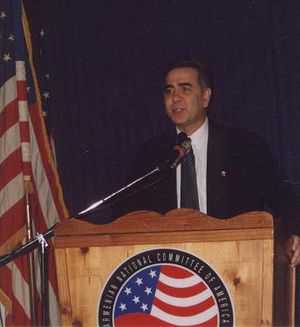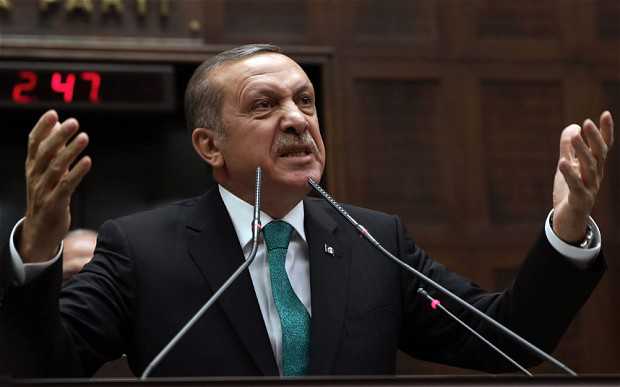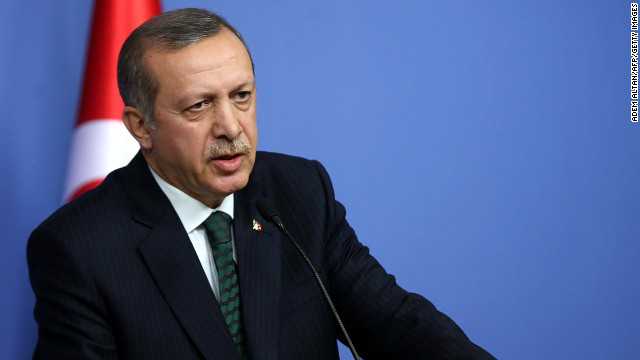UK Officials Misled Parliament on Armenian Genocide
A prominent legal expert, Mr. Geoffrey Robertson, exposed this week the false and inaccurate statements on the Armenian Genocide made by the British Foreign and Commonwealth Office (FCO). The international jurist revealed that for many years the FCO (Foreign Ministry) had misled the British Parliament on the facts of the Armenian Genocide in order to curry favor with the Turkish government.
The 40-page meticulously-researched report, commissioned by the Armenian Centre of London, is based on hitherto secret documents obtained from the Foreign Office through the Freedom of Information Act. Mr. Robertson, the author of a report titled, “Was there an Armenian Genocide?” served as first President of the UN War Crimes Court in Sierra Leone.
Mr. Robertson had to make repeated requests over several months to the British government in order to obtain internal documents that the Foreign Office was legally obligated to release. According to the FCO, some of the documents were not released at all, while those eventually made public were partially blacked out, in order not to damage Britain’s relations with Turkey.
In his report, Mr. Robertson explains that the Armenian Centre had asked him “to consider the attitude of the British government in refusing to accept that the massacres of Armenians in 1915-16 amounted to genocide, and whether its reasons for taking this position are valid and sustainable in international law.”
Regrettably, today’s British officials have forgotten their government’s declaration, issued jointly with France and Russia on May 28, 1915, warning that “in view of the crimes of Turkey against humanity and civilization,” the three great powers would hold responsible “all members of the Ottoman government” who are implicated in the Armenian massacres.
The recently obtained internal documents reveal the Foreign Office’s misleading, false and sinister intent. In a 1999 memorandum, addressed to Minister of State for Europe Joyce Quin and others, the FCO stated that it is not the British government’s obligation to decide what constitutes genocide: “Investigating, analyzing and interpreting history is a matter for historians.” In contrast, Attorney Robertson points out the government’s “basic error” in relying “on historians to decide a legal issue.” He explains that “deciding what amounts to genocide is a matter for judgment according to international law, and not al all is a matter for historians. Historians establish facts: lawyers must judge whether those facts amount to a breach of international law.”
In the same memorandum, the Foreign Office states that there is no documentary evidence proving that the mass killings of Armenians were a result of deliberate state policy. Mr. Robertson calls this statement “another canard — that appears routinely and repeatedly” in internal FCO communications — “the notion that there must be some written document that records a government or leadership decision to exterminate the Armenian people.” Mr. Robertson points out that “no such document, of course, exists in relation to the Nazi Holocaust.”
Clearly, the Foreign Office is more concerned about the domestic and overseas ramifications of acknowledging the Armenian Genocide than the crime of genocide itself. Mr. Robertson points out: “the memorandum goes on rather cynically to consider the clout of the campaign to recognise the genocide and notes that ‘the campaign does not appear at this stage to have enough support or direction to seriously embarrass HMG [Her Majesty’s Government].’”
The Foreign Office also places a higher premium on appeasing Turkey than on the moral issues arising from the attempted extermination of an entire nation. “HMG is open to criticism in terms of the ethical dimension,” the FCO readily admits. “But given the importance of our relations (political, strategic and commercial) with Turkey, and that recognising the genocide would provide no practical benefit to the UK or the few survivors of the killings still alive today, nor would it help a rapprochement between Armenia and Turkey, the current line is the only feasible option.” Mr. Robertson sarcastically, yet sadly, remarks: “This particular genocide could not be recognised — not because it had not taken place, but because it was politically and commercially inconvenient to do so.”
Another false argument advanced by the Foreign Office in several memoranda is the contention that the UN Genocide Convention of 1948 has no retroactive effect and therefore, does not apply to the Armenian Genocide. Mr. Robertson, a top expert in the field of international law, quickly quashes this “bad point,” because “the rule against retroactivity applies to criminal charges, made against individuals, of offences which were not against the law at the time they were allegedly committed. Nobody is suggesting that criminal charges should be brought now against long dead individuals — the question is whether the massacre of the Armenians is correctly described as ‘genocide,’ according to the definition adopted by the UN Convention in 1948.”
British Minister of State for Europe, Joyce Quin, was so incensed by her government’s extremism in “genocide denial,” and its allegation that there was no evidence of a Turkish intent to commit genocide that, in an April 13, 1999 memorandum to the Foreign Office, she pointed out that the issue of intent had never been examined by government officials.
Mr. Robertson’s report then relates the diplomatic scandal involving Thorda Abott-Watt, the British Ambassador to Armenia, who shamelessly questioned the veracity of the Armenian Genocide during a 2004 interview in Yerevan. She stated that the evidence regarding the Armenian Genocide “was not sufficiently unequivocal” to be categorized as genocide under the UN Genocide Convention. In response to several columns I wrote at that time, thousands of readers worldwide inundated the British Foreign Office and the Armenian Foreign Ministry with letters of complaint. The Armenian government finally delivered a “Note verbale” (protest note) to the British government. Mr. Robertson uncovered an internal FCO memorandum written during that controversy, suggesting that the British government maintain its denialist policy, since Turkey “devotes major diplomatic resources to heading off any possible recognition. Turkey would react very strongly indeed to any suggestion of recognition by the UK.”
In his examination of the hundreds of pages of recently released documents, Mr. Robertson came across “only one obscure and dismissive reference” by the Foreign Office to the “one credible international inquiry” that classified the Armenian mass killings as Genocide. This unique study was carried out in 1985 by the British Special Rapporteur, Benjamin Whitaker, at the request of the UN Sub-Commission on the Prevention of Discrimination and Protection of Minorities. To his chagrin, Mr. Robertson found out that the Foreign Office had issued a memorandum advising government ministers to dismiss the UN 1985 report by stating that “since then, we are not aware of it being mentioned in any UN document or forum.”
Even after several European countries had recognized the Armenian Genocide, the Foreign Office continued to stubbornly cling to its denialist policy by advising Minister of State for Europe, Geoff Hoon, that “Turkey is neuralgic and defensive about the charge of genocide despite the fact that the events occurred at the time of the Ottoman Empire as opposed to modern day Turkey. There were many Turks who lost their lives in the war and there may also be an element of concern over compensation claims should they accept the charge of genocide. This defensiveness has meant that Turkey has historically stifled debate at home and devoted considerable diplomatic effort to dissuading any further recognition.”
Finally, in October 2007, when the U.S. House Foreign Affairs Committee adopted a resolution acknowledging the Armenian Genocide, the Foreign Office wrote an alarming memorandum, expressing concern that “the Armenian diaspora worldwide lobbying machine” would now “go into overdrive!”
Mr. Robertson, based on his examination of the released internal documents written over a 10-year period, concludes that the advice given by the British Foreign Office to government ministers “reflects neither the law of genocide nor the demonstrable facts of the massacres in 1915-16, and has been calculated to mislead parliament into believing that there has been an assessment of evidence and an exercise of judgment on that evidence.”
Mr. Robertson further establishes that the “parliament has been routinely misinformed, by ministers who have recited FCO briefs without questioning their accuracy. HMG’s [Her Majesty’s Government] real and only policy has been to evade truthful answers to questions about the Armenian genocide, because the truth would discomfort the Turkish government!”
In view of revelations of such misconduct and misrepresentation, the British Parliament should hold formal hearings and investigate the conduct of all officials who provided false and misleading information to Parliament members for well over a decade. Those found to be either negligent in carrying out their duties or complicit in providing outright falsehoods, should have charges filed against them or dismissed from their governmental posts.
In addition, Mr. Robertson, a pre-eminent international jurist, should be asked to file legal action against the Turkish government in British courts, and more importantly, in the European Court of Human Rights.
This extremely valuable report should be translated into several major languages and disseminated worldwide.







